副词-总结
- 格式:doc
- 大小:78.50 KB
- 文档页数:10
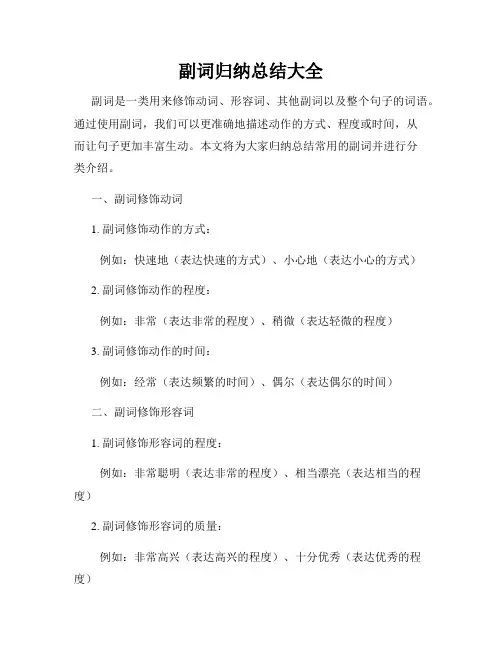
副词归纳总结大全副词是一类用来修饰动词、形容词、其他副词以及整个句子的词语。
通过使用副词,我们可以更准确地描述动作的方式、程度或时间,从而让句子更加丰富生动。
本文将为大家归纳总结常用的副词并进行分类介绍。
一、副词修饰动词1. 副词修饰动作的方式:例如:快速地(表达快速的方式)、小心地(表达小心的方式)2. 副词修饰动作的程度:例如:非常(表达非常的程度)、稍微(表达轻微的程度)3. 副词修饰动作的时间:例如:经常(表达频繁的时间)、偶尔(表达偶尔的时间)二、副词修饰形容词1. 副词修饰形容词的程度:例如:非常聪明(表达非常的程度)、相当漂亮(表达相当的程度)2. 副词修饰形容词的质量:例如:非常高兴(表达高兴的程度)、十分优秀(表达优秀的程度)三、副词修饰其他副词1. 副词修饰副词的程度:例如:非常快速地(表达非常快速的程度)、相当小心地(表达相当小心的程度)2. 副词修饰副词的频率:例如:非常经常地(表达非常经常的频率)、有时偶尔(表达有时偶尔的频率)四、副词修饰整个句子1. 副词修饰句子的程度:例如:确实,这部电影非常好看(表达非常的程度)2. 副词修饰句子的条件:例如:只要努力,你一定能成功(表达条件的程度)3. 副词修饰句子的结果:例如:其实,小明并不喜欢这首歌(表达结果的程度)综上所述,副词在句子中起到了丰富语言表达的作用,通过修饰动词、形容词、其他副词以及整个句子,我们可以更准确地表达动作的方式、程度或时间。
在写作中,合理运用副词可以使文句更加地流畅、准确,让读者更好的理解所表达的意思。
希望本文对您在副词的使用上有所帮助,同时也希望大家能够在写作中更加注重细节,让文章更加生动有趣。
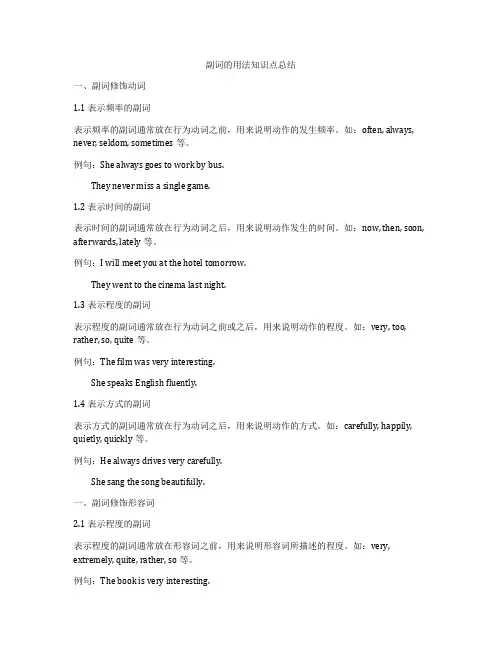
副词的用法知识点总结一、副词修饰动词1.1 表示频率的副词表示频率的副词通常放在行为动词之前,用来说明动作的发生频率。
如:often, always, never, seldom, sometimes等。
例句:She always goes to work by bus.They never miss a single game.1.2 表示时间的副词表示时间的副词通常放在行为动词之后,用来说明动作发生的时间。
如:now, then, soon, afterwards, lately等。
例句:I will meet you at the hotel tomorrow.They went to the cinema last night.1.3 表示程度的副词表示程度的副词通常放在行为动词之前或之后,用来说明动作的程度。
如:very, too, rather, so, quite等。
例句:The film was very interesting.She speaks English fluently.1.4 表示方式的副词表示方式的副词通常放在行为动词之后,用来说明动作的方式。
如:carefully, happily, quietly, quickly等。
例句:He always drives very carefully.She sang the song beautifully.一、副词修饰形容词2.1 表示程度的副词表示程度的副词通常放在形容词之前,用来说明形容词所描述的程度。
如:very, extremely, quite, rather, so等。
例句:The book is very interesting.She looks extremely tired.二、副词修饰副词3.1 表示程度的副词表示程度的副词通常放在另一个副词之前,用来说明副词的程度。
如:very, too, quite, so, rather等。
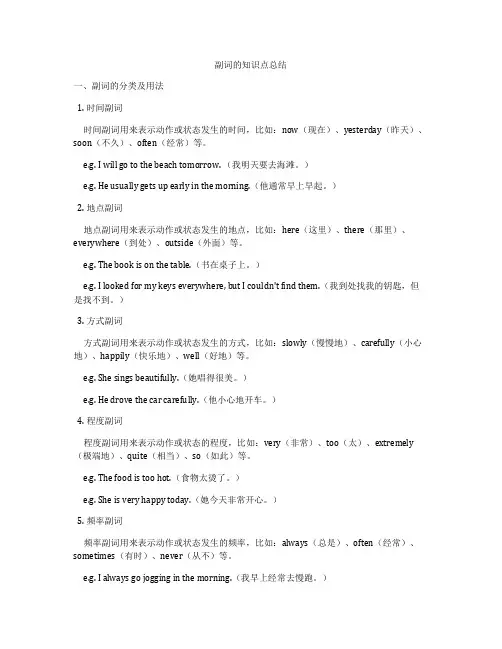
副词的知识点总结一、副词的分类及用法1. 时间副词时间副词用来表示动作或状态发生的时间,比如:now(现在)、yesterday(昨天)、soon(不久)、often(经常)等。
e.g. I will go to the beach tomorrow. (我明天要去海滩。
)e.g. He usually gets up early in the morning.(他通常早上早起。
)2. 地点副词地点副词用来表示动作或状态发生的地点,比如:here(这里)、there(那里)、everywhere(到处)、outside(外面)等。
e.g. The book is on the table.(书在桌子上。
)e.g. I looked for my keys everywhere, but I couldn't find them.(我到处找我的钥匙,但是找不到。
)3. 方式副词方式副词用来表示动作或状态发生的方式,比如:slowly(慢慢地)、carefully(小心地)、happily(快乐地)、well(好地)等。
e.g. She sings beautifully.(她唱得很美。
)e.g. He drove the car carefully.(他小心地开车。
)4. 程度副词程度副词用来表示动作或状态的程度,比如:very(非常)、too(太)、extremely (极端地)、quite(相当)、so(如此)等。
e.g. The food is too hot.(食物太烫了。
)e.g. She is very happy today.(她今天非常开心。
)5. 频率副词频率副词用来表示动作或状态发生的频率,比如:always(总是)、often(经常)、sometimes(有时)、never(从不)等。
e.g. I always go jogging in the morning.(我早上经常去慢跑。
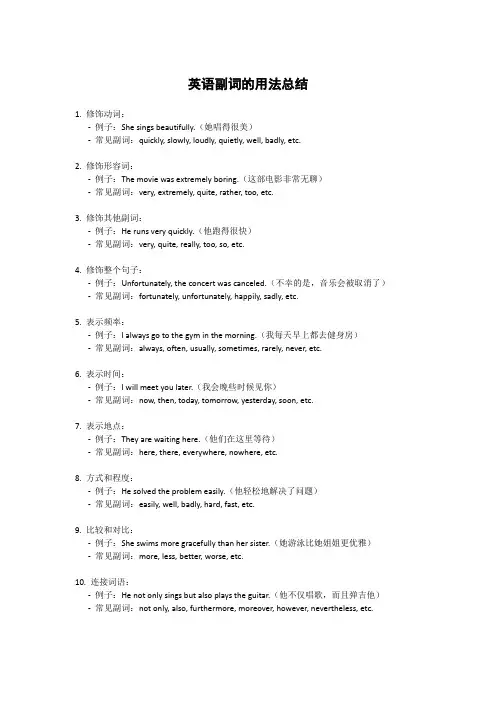
英语副词的用法总结1. 修饰动词:-例子:She sings beautifully.(她唱得很美)-常见副词:quickly, slowly, loudly, quietly, well, badly, etc.2. 修饰形容词:-例子:The movie was extremely boring.(这部电影非常无聊)-常见副词:very, extremely, quite, rather, too, etc.3. 修饰其他副词:-例子:He runs very quickly.(他跑得很快)-常见副词:very, quite, really, too, so, etc.4. 修饰整个句子:-例子:Unfortunately, the concert was canceled.(不幸的是,音乐会被取消了)-常见副词:fortunately, unfortunately, happily, sadly, etc.5. 表示频率:-例子:I always go to the gym in the morning.(我每天早上都去健身房)-常见副词:always, often, usually, sometimes, rarely, never, etc.6. 表示时间:-例子:I will meet you later.(我会晚些时候见你)-常见副词:now, then, today, tomorrow, yesterday, soon, etc.7. 表示地点:-例子:They are waiting here.(他们在这里等待)-常见副词:here, there, everywhere, nowhere, etc.8. 方式和程度:-例子:He solved the problem easily.(他轻松地解决了问题)-常见副词:easily, well, badly, hard, fast, etc.9. 比较和对比:-例子:She swims more gracefully than her sister.(她游泳比她姐姐更优雅)-常见副词:more, less, better, worse, etc.10. 连接词语:-例子:He not only sings but also plays the guitar.(他不仅唱歌,而且弹吉他)-常见副词:not only, also, furthermore, moreover, however, nevertheless, etc.。

副词知识点总结简单一、什么是副词副词是一类用来修饰动词、形容词、其他副词以及整个句子的词语,它用来表示时间、地点、方式、程度、原因、条件、结果以及其他语法意义。
副词通常可以回答以下问题:when? where? how? how often? how much? why?以及in what way?等。
例如:He runs quickly.(时间)She lives nearby.(地点)They speak English fluently.(方式)He is extremely happy.(程度)She left because she was upset.(原因)If it rains, we won't go out.(条件)He worked very hard, so he passed the exam.(结果)二、副词的分类1. 时间副词时间副词用来表示动作的时间,它通常可以回答when?如today, tomorrow, yesterday, now, soon, then, already, recently等。
例句:We will go to the park tomorrow.He has already finished his homework.I saw him yesterday.2. 地点副词地点副词用来表示动作发生的地点,它通常可以回答 where?如here, there, everywhere, nowhere, upstairs, downstairs, nearby等。
例句:I looked for my keys everywhere.She is downstairs.3. 方式副词方式副词用来表示动作的方式,通常可以回答how?和in what way?如carefully, quickly, slowly, well, badly, fluently, quietly等。
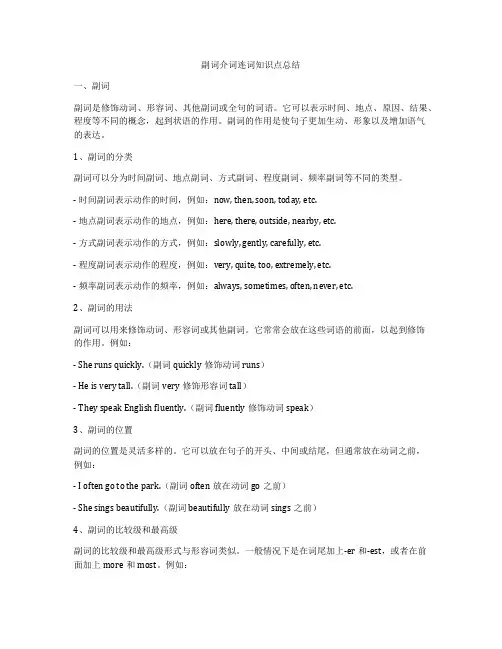
副词介词连词知识点总结一、副词副词是修饰动词、形容词、其他副词或全句的词语。
它可以表示时间、地点、原因、结果、程度等不同的概念,起到状语的作用。
副词的作用是使句子更加生动、形象以及增加语气的表达。
1、副词的分类副词可以分为时间副词、地点副词、方式副词、程度副词、频率副词等不同的类型。
- 时间副词表示动作的时间,例如:now, then, soon, today, etc.- 地点副词表示动作的地点,例如:here, there, outside, nearby, etc.- 方式副词表示动作的方式,例如:slowly, gently, carefully, etc.- 程度副词表示动作的程度,例如:very, quite, too, extremely, etc.- 频率副词表示动作的频率,例如:always, sometimes, often, never, etc.2、副词的用法副词可以用来修饰动词、形容词或其他副词。
它常常会放在这些词语的前面,以起到修饰的作用。
例如:- She runs quickly.(副词quickly修饰动词runs)- He is very tall.(副词very修饰形容词tall)- They speak English fluently.(副词fluently修饰动词speak)3、副词的位置副词的位置是灵活多样的。
它可以放在句子的开头、中间或结尾,但通常放在动词之前,例如:- I often go to the park.(副词often放在动词go之前)- She sings beautifully.(副词beautifully放在动词sings之前)4、副词的比较级和最高级副词的比较级和最高级形式与形容词类似。
一般情况下是在词尾加上-er和-est,或者在前面加上more和most。
例如:- slowly(原级)- more slowly(比较级)- most slowly(最高级)5、副词的常用错误在使用副词的时候,往往会出现一些常见的错误,例如将形容词误用为副词,副词性词语拼写错误等。
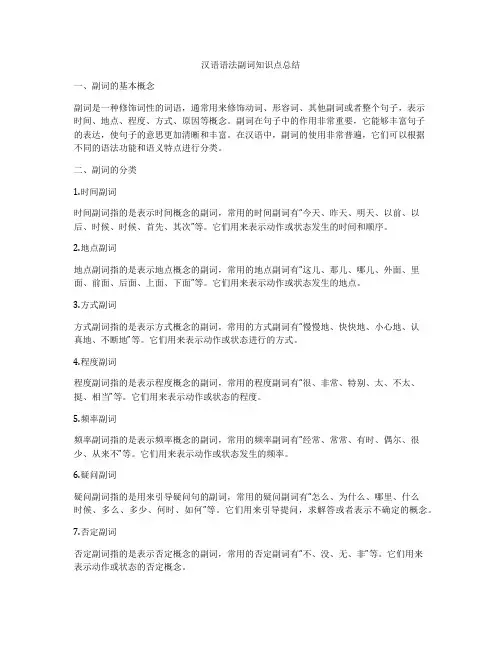
汉语语法副词知识点总结一、副词的基本概念副词是一种修饰词性的词语,通常用来修饰动词、形容词、其他副词或者整个句子,表示时间、地点、程度、方式、原因等概念。
副词在句子中的作用非常重要,它能够丰富句子的表达,使句子的意思更加清晰和丰富。
在汉语中,副词的使用非常普遍,它们可以根据不同的语法功能和语义特点进行分类。
二、副词的分类1.时间副词时间副词指的是表示时间概念的副词,常用的时间副词有“今天、昨天、明天、以前、以后、时候、时候、首先、其次”等。
它们用来表示动作或状态发生的时间和顺序。
2.地点副词地点副词指的是表示地点概念的副词,常用的地点副词有“这儿、那儿、哪儿、外面、里面、前面、后面、上面、下面”等。
它们用来表示动作或状态发生的地点。
3.方式副词方式副词指的是表示方式概念的副词,常用的方式副词有“慢慢地、快快地、小心地、认真地、不断地”等。
它们用来表示动作或状态进行的方式。
4.程度副词程度副词指的是表示程度概念的副词,常用的程度副词有“很、非常、特别、太、不太、挺、相当”等。
它们用来表示动作或状态的程度。
5.频率副词频率副词指的是表示频率概念的副词,常用的频率副词有“经常、常常、有时、偶尔、很少、从来不”等。
它们用来表示动作或状态发生的频率。
6.疑问副词疑问副词指的是用来引导疑问句的副词,常用的疑问副词有“怎么、为什么、哪里、什么时候、多么、多少、何时、如何”等。
它们用来引导提问,求解答或者表示不确定的概念。
7.否定副词否定副词指的是表示否定概念的副词,常用的否定副词有“不、没、无、非”等。
它们用来表示动作或状态的否定概念。
8.插入副词插入副词指的是用来引起说话者的注意或者表示语气的副词,常用的插入副词有“其实、恐怕、反正、总之、只是、毕竟、何况”等。
它们用来提醒或者加强语气的作用。
三、副词的使用规则1.副词与动词的搭配副词通常用来修饰动词或者整个句子,表示动作或状态的时间、地点、程度、方式、原因等。
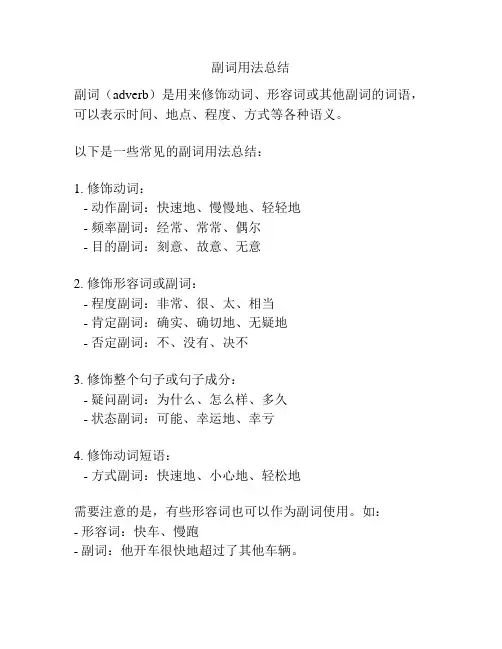
副词用法总结
副词(adverb)是用来修饰动词、形容词或其他副词的词语,可以表示时间、地点、程度、方式等各种语义。
以下是一些常见的副词用法总结:
1. 修饰动词:
- 动作副词:快速地、慢慢地、轻轻地
- 频率副词:经常、常常、偶尔
- 目的副词:刻意、故意、无意
2. 修饰形容词或副词:
- 程度副词:非常、很、太、相当
- 肯定副词:确实、确切地、无疑地
- 否定副词:不、没有、决不
3. 修饰整个句子或句子成分:
- 疑问副词:为什么、怎么样、多久
- 状态副词:可能、幸运地、幸亏
4. 修饰动词短语:
- 方式副词:快速地、小心地、轻松地
需要注意的是,有些形容词也可以作为副词使用。
如:
- 形容词:快车、慢跑
- 副词:他开车很快地超过了其他车辆。
此外,副词的位置也有一定规则:
- 修饰动词时,通常位于动词之前:他认真地写作业。
- 修饰形容词或副词时,通常位于其前面:这个问题非常困难。
- 修饰整个句子或句子成分时,通常位于句首或句尾:幸运地,我们终于找到了答案。
我们终于找到了答案,幸运地。
需要注意的是,有些副词的位置可灵活变化,但要注意语序的合理性。
以上只是一些常见的副词用法总结,实际使用中还需根据具体情况灵活运用。
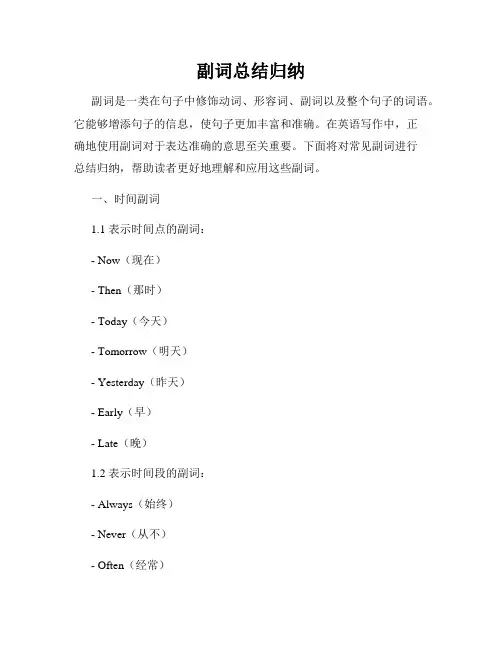
副词总结归纳副词是一类在句子中修饰动词、形容词、副词以及整个句子的词语。
它能够增添句子的信息,使句子更加丰富和准确。
在英语写作中,正确地使用副词对于表达准确的意思至关重要。
下面将对常见副词进行总结归纳,帮助读者更好地理解和应用这些副词。
一、时间副词1.1 表示时间点的副词:- Now(现在)- Then(那时)- Today(今天)- Tomorrow(明天)- Yesterday(昨天)- Early(早)- Late(晚)1.2 表示时间段的副词:- Always(始终)- Never(从不)- Often(经常)- Sometimes(有时)- Rarely(很少)- Usually(通常)- Frequently(频繁地)二、地点副词2.1 地点副词:- Here(这里)- There(那里)- Everywhere(到处)- Nowhere(无处)- Somewhere(某处)- Anywhere(任何地方)2.2 方向副词:- Up(向上)- Down(向下)- Inside(里面)- Outside(外面)- Backward(向后)- Forward(向前)- Sideways(侧身地)三、方式副词3.1 表示方式的副词:- Quickly(快速地)- Slowly(慢慢地)- Carefully(仔细地)- Loudly(大声地)- Quietly(安静地)- Well(好地)- Badly(糟糕地)3.2 延续程度的副词:- Completely(完全地)- Partly(部分地)- Almost(几乎)- Nearly(近乎)- Entirely(完全地)- Barely(勉强)四、程度副词4.1 表示程度的副词:- Very(非常)- Extremely(极其)- Quite(相当)- Really(真正地)- Rather(相当)- Too(太)- Fairly(相当)4.2 表示否定程度的副词:- Not(不)- Never(从不)- Hardly(几乎不)- Rarely(很少)- Scarcely(几乎不)- Seldom(很少)五、频率副词5.1 表示频率的副词:- Always(总是)- Usually(通常)- Often(经常)- Sometimes(有时)- Occasionally(偶尔)- Rarely(很少)- Never(从不)六、方式副词6.1 表示评价的副词:- Well(好)- Badly(糟糕)- Excellently(优秀地)- Perfectly(完美地)- Awfully(糟糕地)- Wonderfully(美妙地)6.2 表示固定搭配的副词:- By accident(偶然地)- On purpose(故意地)- In vain(徒劳地)- In general(一般来说)- For example(例如)- In particular(特别地)总结归纳了一些常见的副词及其分类。
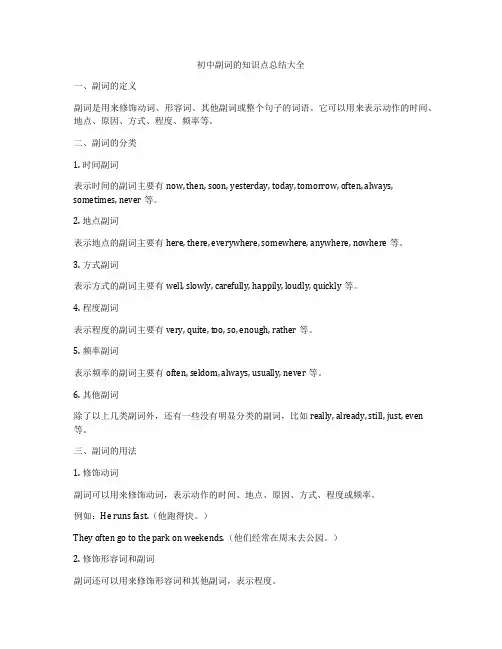
初中副词的知识点总结大全一、副词的定义副词是用来修饰动词、形容词、其他副词或整个句子的词语。
它可以用来表示动作的时间、地点、原因、方式、程度、频率等。
二、副词的分类1. 时间副词表示时间的副词主要有now, then, soon, yesterday, today, tomorrow, often, always, sometimes, never等。
2. 地点副词表示地点的副词主要有here, there, everywhere, somewhere, anywhere, nowhere等。
3. 方式副词表示方式的副词主要有well, slowly, carefully, happily, loudly, quickly等。
4. 程度副词表示程度的副词主要有very, quite, too, so, enough, rather等。
5. 频率副词表示频率的副词主要有often, seldom, always, usually, never等。
6. 其他副词除了以上几类副词外,还有一些没有明显分类的副词,比如really, already, still, just, even 等。
三、副词的用法1. 修饰动词副词可以用来修饰动词,表示动作的时间、地点、原因、方式、程度或频率。
例如:He runs fast.(他跑得快。
)They often go to the park on weekends.(他们经常在周末去公园。
)2. 修饰形容词和副词副词还可以用来修饰形容词和其他副词,表示程度。
例如:She is very beautiful.(她非常漂亮。
)3. 修饰整个句子副词还可以用来修饰整个句子,表示说话人的态度、角度或者整个句子的总体情况。
例如:Hopefully, everything will be fine.(希望一切顺利。
)四、副词的用法注意事项1. 位置副词一般放在被修饰的词语之后,但有时也会放在被修饰的词语之前。
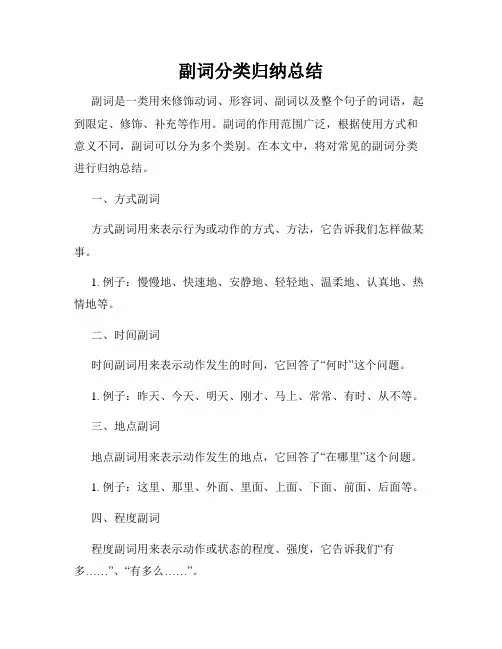
副词分类归纳总结副词是一类用来修饰动词、形容词、副词以及整个句子的词语,起到限定、修饰、补充等作用。
副词的作用范围广泛,根据使用方式和意义不同,副词可以分为多个类别。
在本文中,将对常见的副词分类进行归纳总结。
一、方式副词方式副词用来表示行为或动作的方式、方法,它告诉我们怎样做某事。
1. 例子:慢慢地、快速地、安静地、轻轻地、温柔地、认真地、热情地等。
二、时间副词时间副词用来表示动作发生的时间,它回答了“何时”这个问题。
1. 例子:昨天、今天、明天、刚才、马上、常常、有时、从不等。
三、地点副词地点副词用来表示动作发生的地点,它回答了“在哪里”这个问题。
1. 例子:这里、那里、外面、里面、上面、下面、前面、后面等。
四、程度副词程度副词用来表示动作或状态的程度、强度,它告诉我们“有多……”、“有多么……”。
1. 例子:很、非常、极其、太、相当、完全、十分、特别等。
五、频度副词频度副词用来表示动作发生的频率,它回答了“多久一次”这个问题。
1. 例子:经常、常常、有时、偶尔、总是、从不、每天、每周等。
六、原因副词原因副词用来表示动作发生的原因,它回答了“为什么”这个问题。
1. 例子:因此、所以、因为、由于、为了、就、以致等。
七、否定副词否定副词用来表示否定的意思,它将动作或状态加以否定。
1. 例子:不、没、未、无、否等。
八、疑问副词疑问副词用来提出问题,它帮助我们了解具体的信息。
1. 例子:怎么、为什么、何时、在哪里、如何等。
九、程度副词度副词用来表示措施或行为的阶段、状态。
1. 例子:很、非常、极其、太、相当、完全、十分、特别等。
以上是对常见副词分类的归纳总结。
副词在句子中起到非常重要的修饰作用,通过合理使用各种类型的副词,可以使句子更加丰富、生动,并更准确地表达出我们想要表达的意思。
希望本文对大家在副词的使用上有所启发。
年终总结常用副词大全首先,非常感谢大家一年来的辛勤工作。
作为一支团队,我们共同战胜了许多挑战,取得了一系列令人瞩目的成果。
以下是我对这一年的工作进行总结的副词大全:1. 高效地:我们以高效的方式完成了许多任务,节省了大量时间和资源。
2. 顺利地:我们的工作顺利进行,没有遇到重大困难或阻碍。
3. 稳定地:我们在这一年表现得非常稳定,没有出现过大的波动或变故。
4. 成功地:我们成功地完成了许多关键项目,并取得了显著的成就。
5. 充实地:我们的工作充实而丰富,每天都有充足的任务和挑战。
6. 积极地:我们对工作持积极的态度,充满动力和热情。
7. 有序地:我们的工作有条不紊地进行,始终保持良好的组织和协调。
8. 专业地:我们以专业的态度和技能完成了各项任务。
9. 系统地:我们在这一年按照一套明确的系统完成了各项工作。
10. 完整地:我们的工作经过完整的规划和执行,没有遗漏或中断。
11. 杰出地:我们的表现非常杰出,获得了许多外界的赞誉和认可。
12. 持续地:我们在这一年持续地保持了高水平的工作表现。
13. 快速地:我们以快速的速度完成了许多任务,高效地处理了各种事务。
14. 精确地:我们在这一年的工作中非常精确,避免了错误和差错。
15. 彻底地:我们对任务的完成非常彻底,不放过任何细节和关键点。
16. 全面地:我们的工作全面而全面,涉及各个方面和领域。
17. 协调地:我们的工作在团队中协调进行,充分发挥了每个人的优势。
18. 安全地:我们的工作非常安全,没有发生任何重大事故或损失。
19. 专注地:我们在这一年专注于工作,忽略了无关的干扰和任务。
20. 灵活地:我们适应了各种变化和挑战,灵活地应对了各种情况。
最后,感谢每一位团队成员在这一年的付出。
你们的努力和奉献为公司带来了巨大的成功。
让我们携手共进,迎接新一年的挑战!。
初一重要知识归纳常见副词的用法总结在初一学习的过程中,学生需要掌握并熟练运用副词,以便更好地表达自己的意思。
以下是一些常见的副词及其用法总结。
1. 时间副词- 常用的时间副词有"常常"、"经常"、"有时"、"偶尔"等。
用于描述动作或状态发生的频率和规律。
- 例如:"他常常去图书馆自习","我们有时一起打篮球"。
2. 程度副词- 程度副词用于描述动词或形容词的程度,表示强弱、大小、程度等。
- 常见的程度副词有"很"、"非常"、"非常"、"太"、"有点儿"等。
- 例如:"这个问题很难","她的英语非常好"。
3. 方式副词- 方式副词用于描述动作的方式或方法。
- 常见的方式副词有"慢慢地"、"快速地"、"轻轻地"、"准确地"等。
- 例如:"他轻轻地打开了门","她准确地回答了问题"。
4. 地点副词- 地点副词用于描述动作发生的地点或位置。
- 常见的地点副词有"这里"、"那里"、"上面"、"下面"等。
- 例如:"书包就在这里","请把杯子放在桌子上面"。
5. 频率副词- 频率副词用于描述动作发生的频率。
- 常见的频率副词有"总是"、"从不"、"经常"、"很少"等。
- 例如:"他总是按时完成作业","他很少迟到"。
(完整版)副词知识点总结副词知识点总结一、副词的定义副词是一种用来修饰动词、形容词、其他副词或句子的词语。
它可以表达时间、地点、方式、程度、频率等含义。
二、副词的分类及特点1. 时间副词:表示时间,如今天、昨天、明天等。
特点是以-ly 结尾的副词大多可以表示时间。
2. 地点副词:表示地点,如这里、那里、上面等。
3. 方式副词:表示方式,如慢慢地、轻轻地等。
特点是以-ly 结尾的副词大多可以表示方式。
4. 程度副词:表示程度,如非常、很、稍微等。
特点是以-ly 结尾的副词大多可以表示程度。
5. 频率副词:表示频率,如经常、偶尔、从不等。
三、副词的用法1. 修饰动词:副词可以修饰动词,表示动作的方式、程度、频率等。
- 例如:他快速地跑了起来。
2. 修饰形容词或副词:副词可以修饰形容词或副词,表示形容词或副词的程度。
- 例如:她非常漂亮。
3. 修饰句子:副词可以修饰整个句子,表示说话人的态度、观点等。
- 例如:幸运地,我们赶上了最后一班车。
四、常见的副词以下是一些常见的副词及其分类:- 时间副词:今天、明天、昨天、以前、以后等。
- 地点副词:这里、那里、上面、下面等。
- 方式副词:快速地、慢慢地、轻轻地等。
- 程度副词:很、非常、稍微等。
- 频率副词:常常、偶尔、从不等。
五、注意事项1. 部分副词在句子中的位置是固定的,如常放在动词前面、形容词后面。
2. 一些形容词也可以作为副词使用,但在句子中的位置有所不同。
以上是有关副词的知识点总结,希望对您的研究有所帮助!。
副词知识点总结一、副词的分类1. 根据含义的不同,副词可以分为以下几类:程度副词、时间副词、地点副词、方式副词和疑问副词。
2. 程度副词:表示动词或形容词的程度或强度,比如 very, quite, too, enough, almost 等。
3. 时间副词:表示动作或状态的时间,比如 now, then, soon, yesterday, today, tomorrow 等。
4. 地点副词:表示动作发生的地点或者方向,比如 here, there, everywhere, somewhere, in, out, near, far 等。
5. 方式副词:表示动作进行的方式,比如 well, fast, slowly, carefully 等。
6. 疑问副词:用来引导疑问句,比如 where, when, why, how 等。
二、副词的用法1. 修饰动词:用副词来修饰动词,可以表示动作的方式、程度或者时间等,比如 He runs quickly.(他跑得很快。
)2. 修饰形容词:用副词来修饰形容词,可以表示程度或者强调,比如 It's very cold.(天气很冷。
)3. 修饰其他副词:有些副词可以修饰其他副词,比如 very slowly(非常缓慢)、quite well(相当好)等。
4. 修饰全句:一些副词可以用来修饰整个句子,比如 Unfortunately, we missed the bus.(不幸的是,我们错过了公共汽车。
)5. 修饰介词短语:一些副词可以用来修饰介词短语,比如 He walked around the park.(他在公园里徘徊了一圈。
)三、副词的比较级和最高级1. 大多数副词比较级是在其原形后面加上-er,最高级在其原形后面加上-est,比如 quickly (快),比较级是 quicker(更快),最高级是 quickest(最快)。
2. 一些副词的比较级和最高级需要在前面加上 more 和 most,比如 carefully(小心地),比较级是 more carefully(更小心地),最高级是 most carefully(最小心地)。
语文副词整理知识点总结一、副词的种类1. 按照用途可以分为:(1)程度副词:很、非常、极其、极端、很、十分、极为、非常、格外、特别等。
(2)时间副词:现在、昨天、以前、以后、明天、今天、已经、曾经、再、刚才、之后、不久、很快、马上、一直等。
(3)地点副词:这儿、那儿、上、下、里、外、前、后等。
(4)方式副词、涉及方式、状态或手段,如:慢慢、轻轻、忙忙碌碌、匆匆忙忙、全心全意、如此等。
(5)频度副词:常常、经常、经常常常、偶然、偶尔、有时、有些等。
2. 拟声副词和拟态副词:(1)拟声副词:是根据事物发出的声音或运动的形状或状态模仿而成的词,如:“嗖嗖”、“忽然”、“啪啪”、“滴答”等。
(2)拟态副词:是用来表示事物的形状、颜色、情形、特征或状态的语法成分,如:蓬松、稠密、洁白、湿润。
二、副词的位置1. 修饰动词时:(1)通常位于谓语动词之后,如:她跑得很快。
(2)有些副词可放在动词前面,如:猛然跳起来。
(3)有些副词只能放在一些特殊的时态之后,如:必将成功。
2. 修饰形容词时:(1)放在形容词的后面,如:她穿的很漂亮。
(2)特殊情况下,副词可以放在形容词的前面,如:非常漂亮的景色。
3. 修饰其他副词时:(1)按程度由近到远的次序排列。
(2)位置靠前的副词修饰的范围要比位置靠后的副词修饰的范围广。
4. 修饰全句时:(1)位于句首或句尾。
(2)句首副词把全句作状语,说明主语动作的情况。
(3)句尾副词通常表示说话者的心情、语气、情境等。
三、副词的用法1. 副词与动词的搭配:(1)动词+副词,如:“跑得快”、“想明白”。
(2)形容词+副词,如:“漂亮地”、“快乐地”。
(3)副词+动词,如:“渐渐地长大”、“早早地来到”。
2. 副词的比较级和最高级:(1)由“more”和“most”来构成,如:“more carefully”、“most beautifully”。
3. 副词的叠加:(1)多个副词连用修饰一个谓语动词,在序和逻辑次序上表达在句中较强的程度或比较的程度高低。
副词知识点总结简1. 副词的定义副词是一种用来修饰动词、形容词、其他副词或全句的词类。
它可以表示时间、地点、方式、程度等意义。
副词通常可以在句子中灵活地移动位置,起到修饰、限定、强调等作用。
例如,在句子“I will go there tomorrow.”中,“tomorrow”就是一个副词,表示时间的意义。
副词在句子中通常具有相当重要的地位,可以改变句子的意思和语气。
2. 副词的分类根据其不同的功能和意义,副词可以分为很多种类。
常见的副词可以按照其功能和意义进行分类如下:(1)表示时间的副词:now, then, soon, later, yesterday, today, tomorrow, etc.(2)表示地点的副词:here, there, everywhere, nowhere, etc.(3)表示原因的副词:therefore, so, because, etc.(4)表示程度的副词:very, quite, rather, too, enough, etc.(5)表示方式的副词:well, badly, quickly, slowly, etc.(6)表示频度的副词:often, sometimes, always, never, etc.3. 副词的用法副词的用法相对比较灵活多样,但通常遵循以下几条基本原则:(1)副词可以修饰动词、形容词或其他副词。
例如,“He runs quickly.”中,“quickly”修饰动词“runs”。
(2)副词可以用来修饰、限定或强调整个句子。
例如,“Certainly, I will help you.”中,“Certainly”强调了“我会帮助你”这个整个句子。
(3)副词可以在句子中灵活地移动位置。
可以放在句首、句中或句末。
例如,“I will go there tomorrow.”和“Tomorrow I will go there.”两种表达方式都是正确的。
副词第一部分:副词概述一、副词的定义和分类(一)定义:用来修饰动词、形容词、其它副词或全句的词,表示时间、地点、程度、方式等。
如:Carl runs fast. 卡尔跑得快。
It is raining heavily outside. 外面雨下得很大。
I can’t walk too quickly. 我不能走太快。
Luckily, Mr Black won the lottery. 幸运的是,布莱克先生中了彩票。
(二)副词的分类1. 时间副词now, then, today, tomorrow, yesterday, before, ago, soon, immediately, lately, early, sometimes, often, always, usually, already, yet, ever, never等。
时间副词是选用句子时态时的重要标志,所以一定要牢固掌握不同时态的时间标志。
其中:频率副词:always, usually, often, sometimes, never2. 地点副词outside, inside, upstairs, here, there, home, near, away, in, back, off, up, anywhere等。
地点副词和动词连用时不用加介词。
3. 方式副词quickly, happily, loudly, suddenly, luckily, badly, easily, fast, again等。
方式副词大多是“形容词+ly”构成形式。
4. 程度副词very, quite, rather, too, much, so等。
有些程度副词可以修饰形容词原级,有些能修饰形容词比较级。
5. 疑问副词when, where, why, how, how long, how soon, how often, how far等。
疑问副词常用来构成特殊问句。
6. 关系副词when, where, why, how等。
关系副词常用来引导定语从句。
二、副词的基本用法(一)副词的位置1. 一般作状语时放在谓语动词之后。
如果谓语动词带有宾语,副词则放在宾语后面。
We all study hard.He is drawing a horse carefully.2. 频度副词作状语时放在be动词或助动词、情态动词之后,行为动词之前。
He is always late for school.I often go to see my grandparents on Sunday.我经常星期天看望祖父母。
3. 某些副词为了强调上下句的衔接,放在句子之前。
Suddenly he had a good idea.突然他想出了一个办法。
4. enough修饰形容词和副词时,要放在所修饰词之后。
The boy is old enough to go to school. 这孩子够大了能去上学。
He got up early enough to catch up the train.他起得足够早能赶上火车。
(二)副词的排列顺序1. 副词表示时间、地点时,小单位在前,大单位在后。
如:He comes from New York, America. 他来自美国纽约。
2. 副词表示方式时,拼写短的在前,拼写长的在后,并用and或but等连词连接。
如:Please write slowly and carefully. 请慢一点、仔细一点写。
3. 多个不同副词排列:程度+ 方式+ 地点+ 时间。
如:The man runs very slowly along the river at 6:30 every morning.每天早晨六点半,这个人沿着河边慢跑。
三、副词与形容词的联系(一)形容词变副词的规则1. 一般情况下,在形容词词尾加ly。
如:slow----slowly quick----quickly polite----politelybad----badly careful----carefully2. 以y结尾的,要把y变成i,再加ly。
如:happy----happily easy----easily angry----angrily3. 以le结尾的,去掉e,再加y。
如:terrible----terribly(二)貌似副词的形容词lonely 孤独的, friendly 友好的, lively 生动活泼的, lovely 可爱的(三)既可以是形容词也可以是副词的词late , long, clear, cheap, clean, straight, close, fast, early, hard【专项练习一】基础题一、用所给单词的正确形式填空。
1.He sat _______________ (comfortable) in the chair.2.Please drive your car _______________ (careful).3.Don’t be late again. You should be _______________ (early) tomorrow morning.4.Tom jumped _______________ (high) of all.5.Everyone began to shout _______________ (loud).6.We know you did _______________ (well).7.You looked _______________ (w orry). What’s happened?8.It’s _______________ (real) cold here.9.That sounds _______________ (interest). I am always _______________ (interest) in newfilms10.The Greens are _______________ (happy) to live in this _______________ (noise) street.They have decided to move to another place.11.I like her dress. It looks very _______________ (beauty).12.It’s a _______________ (please) trip for all of us.二、单项选择。
( ) 1. It is _____ nice of you to help me.A. trulyB. trueC. reallyD. real( ) 2. His handbag was stolen on his way back home, _____ his iphone was with him.A. SurprisinglyB. SadlyC. LuckilyD. Hopefully( ) 3. -- Why hasn’t Tom come to the party?-- There is _____ with his brother. He has to look after him.A. something wrongB. anything wrongC. wrong somethingD. wrong anything ( ) 4. Look! There is _____ in the room.A. a green large Chinese carpetB. a Chinese large green carpetC. a green Chinese large carpetD. a large green Chinese carpet( ) 5. -- I won't go to the Great Wall tomorrow. -- I won't, _____.A. neitherB. eitherC. tooD. also( ) 6. He likes to do some reading in the morning, I like it, _____.A. tooB. eitherC. neitherD. also( ) 7. Peter looked _____ when he learned that he hadn’t passed the final exam.A. sadlyB. sadC. happilyD. happy( ) 8. It’s a good habit to keep the classroom _____ all the time.A. cleanlyB. clearlyC. clearD. clean ( ) 9. -- Is there _____ in today’s newspaper?-- Yes. It says that a new president has been elected already.A. anything importantB. any important thingC. important anythingD. any things important( ) 10. Rose caught a _____ cold and has been _____ ill for days.A. bad, badB. bad, badlyC. badly, badD. badly, badly ( ) 11. In the exam, the _____ you are, the _____ mistakes you’ll make.A. carefully, littleB. more careful, fewerC. more careful, lessD. more carefully, fewer( ) 12. Mike went to school today because he felt _____.A. enough wellB. good enoughC. enough goodD. well enough ( ) 13. The night was very _____, so he had to take off his shoes _____.A. quiet, quietlyB. quite, quicklyC. late, quickD. quite, quietly提高题单项选择( ) 1. If you like the chicken, you may have as _____ as you can.A. moreB. manyC. littleD. much ( ) 2. -- Uncle Wang is _____ man that he always helps others. -- Oh, he is really great .A. so friend aB. such a friendlyC. such friendly aD. so a friendly ( ) 3. It was _____ late to catch a bus after the party, so we took a taxi.A. too veryB. much tooC. too muchD. far( ) 4. The plane got back to the airport and landed _____.A. safeB. livelyC. safelyD. safety ( ) 5. You don’t need to go any _____, for the post office is near there.A. farB. fartherC. furthestD. farthest ( ) 6. _____ the young man is running!A. How fastB. How quickC. How fastlyD. What quickly ( ) 7. My sister is good at sports. She can jump _____ than me.A. highestB. very highC. too highD. much higher ( ) 8. -- _____ will you finish the work? -- In a week.A. How oftenB. How soonC. How longD. How far ( ) 9.-- Has Mr. White come _____? -- Yes. He has _____ been here for 10 minutes.A. yet, alreadyB. already, yetC. already, alreadyD. yet, yet ( ) 10. It’s twelve o’c lock at night, but Mr. Zhang is _____ working in the office.A. alreadyB. everC. stillD. yet( ) 11. Bob never does his homework _____ Mary. He makes lots of mistakes.A. so careful asB. as carefully asC. carefully asD. as careful as ( ) 12. _____ you dive into the water, _____ you breathe.A. Deeper; harderB. The deeper; the harderC. The deep; the hardD. Deep; hard( ) 13. -- Can you catch what I said? -- Sorry, I can _____ understand it.A. almostB. hardlyC. nearlyD. never ( ) 14. She always finishes her homework on time. She _____ leaves it for the next day.A. alwaysB. neverC. usuallyD. sometimes ( ) 15. -- _____ will it take us to get there by bus? -- About two hours.A. How soonB. How oftenC. How longD. How quick第二部分:副词辨析well 做副词修饰动词,意思是:好做形容词是形容身体好的,健康的。